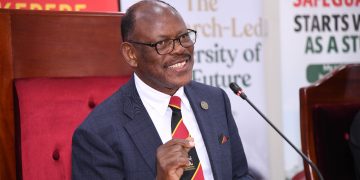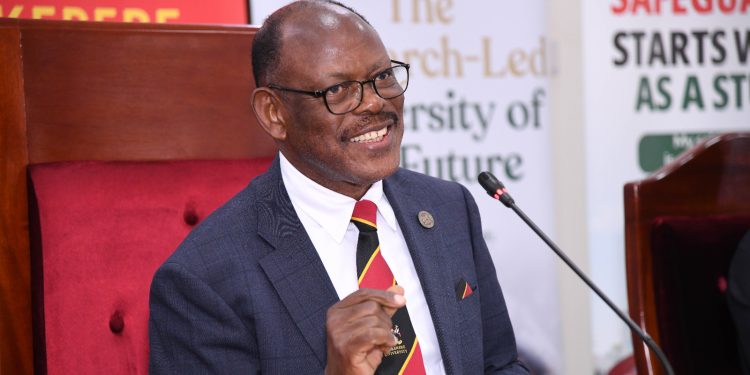Makerere University Vice Chancellor, Prof. Barnabas Nawangwe, has announced key leadership, governance, and staffing developments at the institution, including the appointment of a new Deputy Vice Chancellor, the reinstatement of open student guild campaigns, and the recruitment of new academic staff.
Addressing the media at a press conference held at the university’s Council Room on October 7, 2025, Prof. Nawangwe commended Makerere’s staff for their “diligent and dedicated service” and reaffirmed the university’s commitment to fostering an environment that promotes both academic excellence and responsible citizenship.
“We are committed to creating an enabling environment for both students and staff to produce graduates who are globally competitive, relevant, and responsive to development needs,” he said.
Unveiling New Deputy Vice Chancellor
Prof. Nawangwe introduced Professor Sarah Evelyn Nabwire Ssali, the new Deputy Vice Chancellor (Academic Affairs), who was appointed by the university’s Chancellor, Dr Crispus Kiyonga, on September 23, 2025.
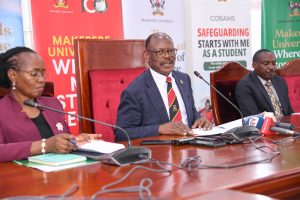
Prof. Ssali, a Professor of Gender and Development Studies, has served Makerere for over two decades, holding key leadership positions including Dean of the School of Women and Gender Studies and Acting Director of the Institute of Gender and Development Studies (IGDS). She is also the Director of the Centre of Excellence in African Identities under the African Research Universities Alliance (ARUA).
“I warmly congratulate Prof. Sarah Ssali on her appointment and look forward to her leadership in steering academic affairs to greater heights,” Prof. Nawangwe said.
He described her as an accomplished scholar and administrator whose experience will strengthen Makerere’s academic leadership and governance.
Student Freedoms Restored
In a move to promote democratic engagement and responsible leadership among students, Makerere University has reinstated open guild campaigns, which had been suspended following the tragic death of a student during campaign activities.
Prof. Nawangwe said the decision followed extensive consultations with student leaders and represents a shared commitment to nurturing civic responsibility within the university community.
“We are restoring a vibrant, participatory, and safe democratic culture on campus,” he said. “Freedom must be balanced with responsibility to ensure peaceful and respectful campaigns that do not disrupt academic programmes or endanger persons or property.”
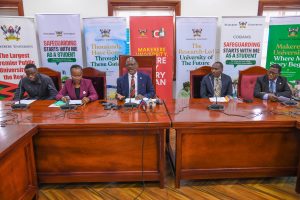
The Vice Chancellor emphasised that Makerere remains an institution that values dialogue and responsible citizenship, noting that leadership training extends beyond classrooms.
“A truly great university must not only nurture academic excellence but also provide a space for free expression and engagement in governance,” he added.
Prof. Nawangwe also assured students that outstanding allowances would be paid once the government releases second-quarter funds, saying the administration has already met and harmonised with the guild leadership on the matter.
Staff Appointments and Exits
Responding to media attention around recent staff changes, the Vice Chancellor confirmed that during its 769th meeting, the Makerere University Appointments Board approved the hiring of 23 new staff members, confirmed 58 others, and accepted 18 resignations.
“Most of the colleagues who resigned left to take up other opportunities in various capacities,” he said. “We congratulate all departing staff and wish them well in their new positions of service.”
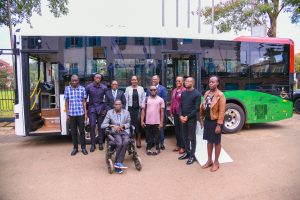
Prof. Nawangwe emphasised that turnover is normal in any academic institution and that Makerere’s recruitment and confirmation processes ensure the university continues to operate effectively.
“Transition is a natural process in all institutions of higher learning,” he explained. “While some staff move on, Makerere maintains a robust recruitment pipeline to ensure teaching, learning, and research remain uninterrupted.”
He concluded by reaffirming the university’s commitment to sound institutional planning and academic continuity. “Makerere continues to demonstrate stability, resilience, and planning as we work together to safeguard the university’s legacy of excellence,” Prof. Nawangwe said.
